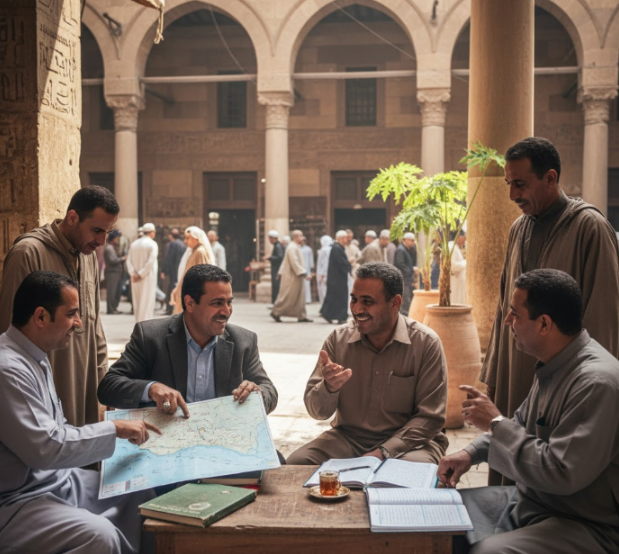When people think of Egypt, the first images that come to mind are the majestic pyramids, the mighty Nile River, and the rich history of one of the world’s oldest civilizations. But there’s another treasure that modern Egypt offers: its language – Egyptian Arabic (العربية المصرية, “el-ʿArabiyya el-Maṣriyya”).
Learning Egyptian Arabic is more than just picking up a dialect; it’s an entryway into the heart of Arab culture. Spoken by over 100 million Egyptians and understood across the Arab world, Egyptian Arabic bridges communication gaps, enriches travel experiences, and opens up countless social and professional opportunities.
What Makes Egyptian Arabic Unique?
Egyptian Arabic, often referred to as Masri, is a dialect that blends influences from ancient Egyptian, Coptic, Turkish, Italian, French, and English. This makes it colorful, expressive, and vibrant. Unlike Modern Standard Arabic (MSA), which is formal and used in writing, Egyptian Arabic is spoken daily — in homes, cafés, songs, and films.
Its rhythm and melodic intonation reflect Egypt’s spirited personality. Words like “habibi” (my dear) and “yalla” (let’s go) are now used globally, thanks to Egyptian pop culture.
Egypt’s long-standing position as a cultural and media hub has shaped the dominance of its dialect. Since the golden age of Egyptian cinema in the 20th century, Egyptian Arabic has reached millions through movies, music, and TV shows — making it the most widely understood Arabic dialect today.
Practical Reasons to Learn Egyptian Arabic
Learning Egyptian Arabic is an excellent choice for anyone interested in the Arabic language and the Arab world. While Modern Standard Arabic (MSA) is the formal, written language across the region, Egyptian Arabic (Masri) is the most widely understood and spoken colloquial dialect.
1. The Gateway to the Arab World: “Lingua Franca”
Egyptian Arabic offers unparalleled accessibility and understanding across different Arab nations, cementing its status as the most beneficial dialect for conversational purposes.
a. Most Widely Understood Dialect:
Egyptian Arabic is understood by a vast majority of the approximately 300 million Arabic speakers worldwide, making it the de facto “lingua franca” of the Arab world. This is due to Egypt’s massive cultural influence, particularly in media.
b. Wider Communication:
Learning Egyptian Arabic allows you to communicate with Arabs from Morocco to the Gulf, even if their own local dialect is very different from yours. You are more likely to be understood by a greater number of people than if you learn any other single dialect.
2. Access to Rich Media and Culture
Learning Egyptian Arabic (Masri) offers a direct gateway to a massive and highly influential body of Arab media and culture, fostering a level of immersion unattainable through Modern Standard Arabic (MSA) alone.
a. Hollywood of the Middle East:
Cairo has historically been the center of Arab cinema, television, and music production. The majority of films, TV series (especially the popular Ramadan series), and popular music are produced in Egyptian Arabic.
b.Cultural Immersion:
By learning the dialect, you gain direct, un-subtitled access to a wealth of popular culture, which is essential for understanding modern Arab identity, humor, and social issues. This deepens your cultural appreciation far beyond what is possible with just translations.
c. Literature and Art:
While literary Arabic is used in formal writing, Egyptian Arabic is increasingly used in vernacular literature, plays, and popular song lyrics.
3. Practical Daily Communication
Learning the local dialect provides an immediate path to genuine connection and practical navigation in daily life.
a. Speak with Locals:
Modern Standard Arabic (MSA) is a formal written and broadcast language that no one speaks naturally in everyday life. If your goal is to have real conversations with people, buy things at the market, make friends, or navigate a city, you must learn a colloquial dialect. Egyptian Arabic is the most practical choice for this in the most populous Arab country.
b. Easy for Beginners (Grammar):
Compared to the highly complex and strict grammar of MSA, Egyptian Arabic is generally considered simpler and less formal in its grammatical structure, making it a great starting point for beginners who prioritize speaking.
c. Build Connections and Friendships:
Egyptians are known for their hospitality and friendliness. Speaking their dialect breaks down barriers, fostering stronger personal rapport and deeper relationships with locals, whether in Egypt or with the Egyptian diaspora globally.
4. Enhanced Travel and Living in Egypt
Knowing Egyptian Arabic goes beyond simple communication; it transforms your interaction with the culture and infrastructure of the country.
a. A World-Class Destination:
Egypt is an incredible country with some of the world’s most famous historical sites, including the Pyramids of Giza and the temples of Luxor. Knowing the local dialect will significantly enhance your travel experiences, allowing for authentic interactions, better bargaining, and a deeper understanding of local customs.
b. Easier Living Abroad:
If you plan to live, work, or study in Egypt, learning Egyptian Arabic is essential for daily life, from dealing with landlords and shopping to simply taking a taxi. Living in Egypt without knowing the local dialect can be challenging.
5. Career and Business Advantages
Beyond cultural enrichment, mastering Egyptian Arabic provides tangible professional benefits across the MENA region. Its widespread understanding makes it a powerful linguistic tool in various high-stakes sectors, directly enhancing career prospects and business outcomes.
a. Regional Relevance:
Proficiency in Egyptian Arabic can be a significant competitive advantage in a professional context, especially in fields like international relations, journalism, diplomacy, and the tourism industry across the entire Middle East and North Africa (MENA) region.
b. Business Relations:
For entrepreneurs and business professionals, speaking the widely understood Egyptian dialect helps in building trust and personal rapport with partners and clients across the region, which is a critical element of business success in the Arab world.
How to Learn Egyptian Arabic Effectively
Mastering Egyptian Arabic requires a mix of formal study and real-world exposure. Here’s a breakdown of the best resources and techniques to learn Egyptian Arabic.
Best Resources: Books, Apps, and Online Courses
Start your journey with tools like:
- Apps: Pimsleur, Drops, and Memrise (Egyptian Arabic versions)
- Books: Kallimni Arabi series
- YouTube Channels: ArabicPod101 and Learn Egyptian Arabic with Maha
Tips for Mastering Pronunciation and Vocabulary
- Listen to Egyptian music and podcasts daily
- Mimic native speakers’ intonation
- Use flashcards for common phrases
- Practice speaking — even if imperfectly
FAQs About Learning Egyptian Arabic
1. Is Egyptian Arabic hard to learn?
Not at all! It’s easier than MSA and has simple grammar.
2. Can I use Egyptian Arabic outside of Egypt?
Yes! Most Arabs understand it, thanks to Egyptian media.
3. How long does it take to become conversational?
With consistent practice, you can converse in 6–8 months.
4. Should I learn MSA first?
Not necessarily. Start with Egyptian Arabic — it’s more practical for daily use.
5. What’s the best way to practice speaking?
Talk with native speakers online or join language exchange groups.
Conclusion
To learn Egyptian Arabic is to unlock the soul of the Arab world. It connects you to Egypt’s humor, art, music, and people in ways no translation can capture. Whether for travel, career, or personal growth, this dialect opens doors to meaningful connections and cultural understanding.
So, if you’re ready to embark on a journey that blends language with life — start learning Egyptian Arabic today. You’ll not only speak the words but also feel the heartbeat of Egypt itself.







